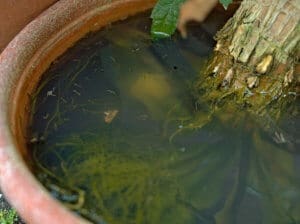 Some parts of Oregon, including Multnomah County, enjoyed record rainfall amounts this spring. In fact, the last time Multnomah County received as much precipitation was 81 years ago. While more rain helps lessen the risks of drought and wildfire, it presents different challenges for residents. Much of that extra rainfall formed stagnant pools and has created ideal mosquito breeding conditions as temperatures have warmed.
Some parts of Oregon, including Multnomah County, enjoyed record rainfall amounts this spring. In fact, the last time Multnomah County received as much precipitation was 81 years ago. While more rain helps lessen the risks of drought and wildfire, it presents different challenges for residents. Much of that extra rainfall formed stagnant pools and has created ideal mosquito breeding conditions as temperatures have warmed.
How bad are the mosquitoes in Multnomah County? So far in 2022, the Multnomah County Vector Control office has trapped over 20,000 mosquitoes during routine trap surveillance–more than four times the total amount captured in all of 2021. While some of the species trapped are more of a nuisance concern, some are vectors for West Nile virus (WNv) and are sent to Oregon State University’s Veterinary Diagnostic Laboratory for testing.
Is West Nile Virus a risk to Oregonians?
Yes. West Nile Virus is a growing risk to Oregonians. While it causes only mild illness in most people, it can be fatal. In Oregon last year, 75 mosquito pools tested positive for WNv in the following counties:
- Umatilla – 1
- Malheur – 2
- Jackson – 3
- Baker – 19
- Morrow – 50
There were five confirmed human cases in Oregon last year, including one in Jackson and one in Klamath County.
How Do Vector Control Agencies Manage These Risks?
Vector control professionals manage risks associated with mosquitoes through Integrated Mosquito Management (IMM) which includes:
- Monitoring mosquito populations and conducting disease testing
- Working with property owners to reduce or eliminate mosquito sources whenever possible
- Controlling mosquito larvae and pupae using bacterial larvicides like Bacillus thuringiensis israelensis (Bti), Spinosad, and insect growth regulators
- Controlling adult mosquitoes using EPA approved adult mosquito treatment products
Does Southern Oregon have the same risks?
Southern Oregon has not experienced the same record rain totals as our northern neighbors with Medford’s precipitation totals being 13% below average from 10/1/2021 to 7/20/2022. In addition, the number of mosquitoes being trapped by Jackson County Vector Control District remains relatively stable compared to recent years. However, that does not mean there is no risk. Even in hot, dry conditions, there are still a wide variety of mosquito sources throughout our county. Jackson County Vector Control District monitors and treats thousands of these sources each year in an effort to control mosquitoes before any disease outbreak occurs and they become a bigger problem. In fact, West Nile virus tends to be more prevalent and spread quicker in hot, dry weather so controlling mosquitoes is just as important as ever, even without excessive rainfall.
What can you do to limit mosquito populations near you?
First of all, inspect your property regularly. Dump out any standing water in dishes, flower pots, spare tires, kiddie pools, etc. No standing water, no mosquitoes.
Second, contact JCVCD.org to get free mosquitofish if you have standing water. Mosquitofish eat mosquito larvae and do well in things like ornamental ponds, stagnant swimming pools, and animal troughs. They are not to be placed in natural bodies of water such as lakes, creeks, and rivers.
If you’re interested in free mosquitofish to control mosquitoes on your property, contact JCVCD today!
The Jackson County Vector Control District (JCVCD) is your resource for education and solutions to reduce the risk to you, your family, and your neighbors related to disease-transmitting pests. Vectors are living organisms that can transmit diseases between humans or from other animals to humans. Oregon’s most common vectors include mosquitoes, flies, rats, and ticks.
For example, JCVCD distributes free mosquito fish to Jackson County residents with ponds or other forms of stagnant water such as unused swimming pools. Mosquito fish feed on mosquito larvae, reducing the population of mosquitoes in your area. Contact JCVCD for more information about getting free mosquito fish or obtaining other educational materials.
